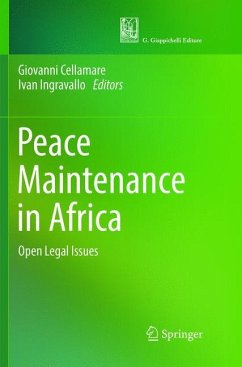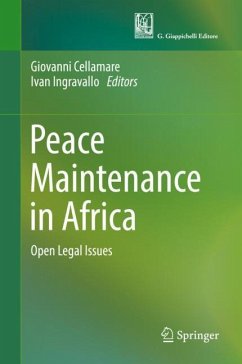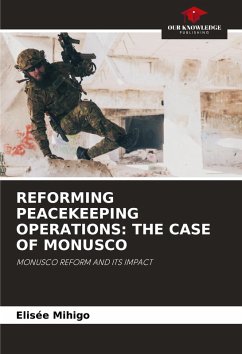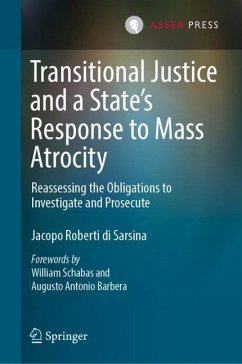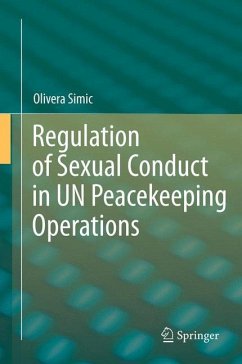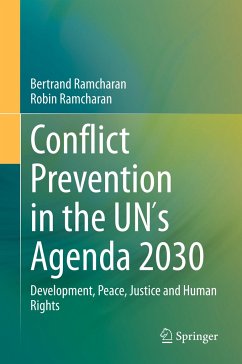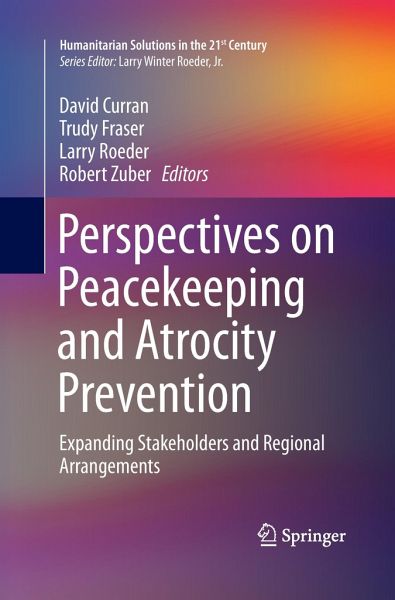
Perspectives on Peacekeeping and Atrocity Prevention
Expanding Stakeholders and Regional Arrangements
Herausgegeben: Curran, David; Fraser, Trudy; Roeder, Larry; Zuber, Robert
Versandkostenfrei!
Versandfertig in 6-10 Tagen
38,99 €
inkl. MwSt.

PAYBACK Punkte
19 °P sammeln!
The current challenges and potential future of peacekeeping in an increasingly complex world take center stage in this far-reaching collection.Contributors advance a nuanced picture of post-conflict environments across different areas of the globe while considering possible deployments of peacekeeping, traditional military and UN forces in semi-autonomous complementary roles. Longstanding debate topics such as the need for a standing UN army and the field implementation of global right-to-protect concepts are discussed, as are emerging ideas in civilian protection, atrocity prevention and bala...
The current challenges and potential future of peacekeeping in an increasingly complex world take center stage in this far-reaching collection.
Contributors advance a nuanced picture of post-conflict environments across different areas of the globe while considering possible deployments of peacekeeping, traditional military and UN forces in semi-autonomous complementary roles. Longstanding debate topics such as the need for a standing UN army and the field implementation of global right-to-protect concepts are discussed, as are emerging ideas in civilian protection, atrocity prevention and balancing triage operations with long-term peacebuilding efforts. Other dispatches chronicle key issues and concerns regarding peacekeeping operations in Brazil, China and diverse regions of Africa.
Included in the coverage:
Protecting strangers: reflections on a cosmopolitan peacekeeping capacity. Towards a standing UN force for peacekeeping.Challenges posed by intervention brigades and other coercive measures in support of the protection of civilians.Addressing the criminal accountability of peacekeepers.The evolution of China's role in peacekeeping and atrocity crime prevention.Businesses and investors as stakeholders in atrocity crime prevention.
Multiple viewpoints, a global scope and real-world clarity make Perspectives on Peacekeeping and Atrocity Prevention an invaluable resource to advance the work of humanitarians, criminologists and students of and professionals in international relations.
"This collection of articles effectively points to the challenges, complexities and sensitivities of preventing and halting mass atrocity crimes in part through the use of UN peacekeeping operations. The volume also inspires further efforts, including the integration of new and younger stakeholders, to mitigate massive human rights
crimes and fully implement the Responsibility to Protect."
Dr. György Tatár
Chair, Budapest Centre for the International Prevention of Genocide and Mass Atrocities
"In a refreshing and engaging manner, this edited volume represents a much-needed contribution to the debate on how best to address current security threats given the limitations and the possibilities of peacekeeping and atrocity prevention. A compelling feature of the book is its exploration of often-neglected stakeholder perspectives alongside first-hand knowledge of the UN system and astute academic observations of key peacekeeping concepts, mandates and practices. Each chapter's concluding recommendations invite scholars and policy makers to critically interrogate their own beliefs, assumptions and preferred solutions for keeping the peace and preventing mass atrocity violence."
Dr. Maria Stern
Professor in Peace and Development Studies, School of Global Studies
University of Gothenburg
Contributors advance a nuanced picture of post-conflict environments across different areas of the globe while considering possible deployments of peacekeeping, traditional military and UN forces in semi-autonomous complementary roles. Longstanding debate topics such as the need for a standing UN army and the field implementation of global right-to-protect concepts are discussed, as are emerging ideas in civilian protection, atrocity prevention and balancing triage operations with long-term peacebuilding efforts. Other dispatches chronicle key issues and concerns regarding peacekeeping operations in Brazil, China and diverse regions of Africa.
Included in the coverage:
Protecting strangers: reflections on a cosmopolitan peacekeeping capacity. Towards a standing UN force for peacekeeping.Challenges posed by intervention brigades and other coercive measures in support of the protection of civilians.Addressing the criminal accountability of peacekeepers.The evolution of China's role in peacekeeping and atrocity crime prevention.Businesses and investors as stakeholders in atrocity crime prevention.
Multiple viewpoints, a global scope and real-world clarity make Perspectives on Peacekeeping and Atrocity Prevention an invaluable resource to advance the work of humanitarians, criminologists and students of and professionals in international relations.
"This collection of articles effectively points to the challenges, complexities and sensitivities of preventing and halting mass atrocity crimes in part through the use of UN peacekeeping operations. The volume also inspires further efforts, including the integration of new and younger stakeholders, to mitigate massive human rights
crimes and fully implement the Responsibility to Protect."
Dr. György Tatár
Chair, Budapest Centre for the International Prevention of Genocide and Mass Atrocities
"In a refreshing and engaging manner, this edited volume represents a much-needed contribution to the debate on how best to address current security threats given the limitations and the possibilities of peacekeeping and atrocity prevention. A compelling feature of the book is its exploration of often-neglected stakeholder perspectives alongside first-hand knowledge of the UN system and astute academic observations of key peacekeeping concepts, mandates and practices. Each chapter's concluding recommendations invite scholars and policy makers to critically interrogate their own beliefs, assumptions and preferred solutions for keeping the peace and preventing mass atrocity violence."
Dr. Maria Stern
Professor in Peace and Development Studies, School of Global Studies
University of Gothenburg



